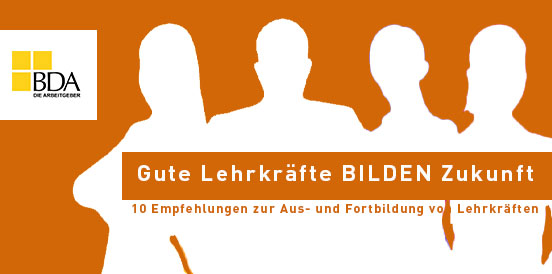BDA calls for practical training for teachers
BDA AGENDA 25/23 | TOPIC OF THE WEEK | November 30, 2023
An efficient education system needs well-trained teachers. In its new position paper "Good teachers EDUCATE the future", the BDA makes 10 recommendations for better initial and further training for teachers.
School builds the future
Good schools and good teachers are a decisive factor for the future of Germany as a location for education and business: the skills of the younger generations determine the innovative strength and transformation capacity of our economy and society.
However, teachers often feel inadequately prepared for school. They lack up-to-date and helpful further training for their day-to-day work. At the same time, they are challenged more than ever in their profession. The acute shortage of teaching staff has revived the discussion about the flexibility of training and the best way to enter the profession. However, action must now follow.
10 recommendations of the BDA:
- Training at universities must first and foremost relate to the profession. It should impart comprehensive practical skills and knowledge for the teaching profession. Dealing with heterogeneity should be a particular focus.
- The nationwide educational standards for teacher training should be binding in all phases. The ministries of education and cultural affairs should specify, update and monitor these standards.
- The university and school should cooperate reliably in the practical parts of the course, including with study seminars. Career-related formats for student teachers in the subject will help to prevent students dropping out.
- It should be possible to dovetail the Master's degree with the preparatory service right up to the professional entry phase. Dual study programs offer an additional option, especially for STEM subjects. Career choice must also only be possible with a Master's degree and thus the single-subject teacher as an option.
- Teachers with lateral and lateral entry bring valuable perspectives with their professional backgrounds. They should be provided with specific pedagogical and didactic qualifications, including on a part-time basis.
- Single-subject studies should be made possible for vocational schools in the industrial-technical sector in particular. Universities of applied sciences should be more closely involved in training for vocational schools.
- Universities should incorporate teacher training programs into their profile and strategy in a targeted manner. They can also provide more training for teachers.
- Continuing education must be promoted and organized more sustainably. Schools must be able to use further education and training independently for staff and school development, including learning in companies.
- Staff development and further training should involve entire teams, and new approaches should be monitored and evaluated. To do this, schools need a
- In particular, teachers should be enabled to use digital media for teaching and learning, for diagnostics and differentiation, also supported by AI.
SCHULEWIRTSCHAFT supports company internships for teachers. The Stiftung der Deutschen Wirtschaft promotes the professional attitude of future teachers with the Studienkolleg.








